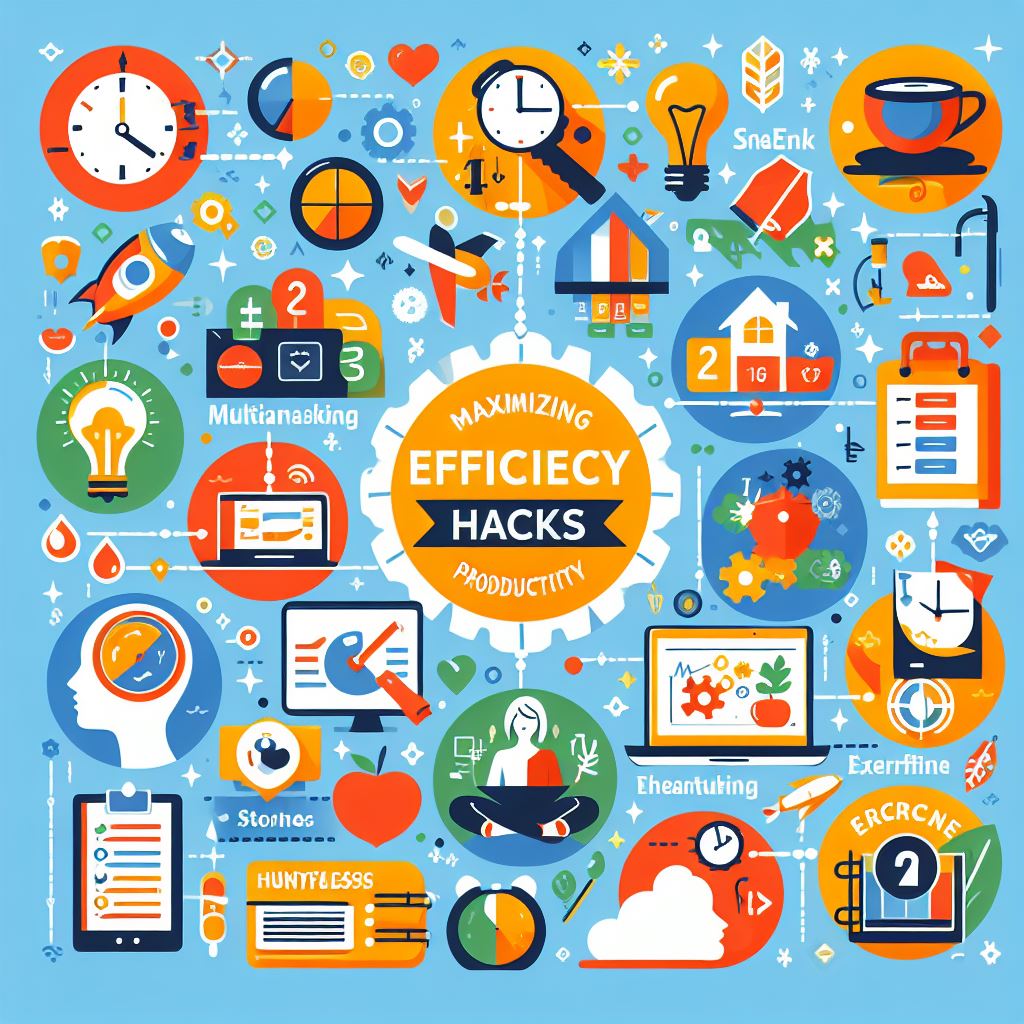Introduction: Enhancing Workday Efficiency
In today’s fast-paced world, maximizing productivity is essential for success. Whether you’re a busy professional, a student juggling multiple responsibilities, or an entrepreneur managing a growing business, finding ways to double your output can significantly impact your overall performance and well-being.
In today’s fast-paced world, where demands are constantly evolving and expectations are high, maximizing productivity has become more crucial than ever. Whether you’re striving to meet deadlines, juggle multiple tasks, or simply carve out time for personal pursuits amidst a busy schedule, the ability to double your output can be a game-changer.
Picture this: you start your workday with a clear plan in mind, ready to tackle your tasks head-on. But as the day progresses, distractions creep in, priorities shift, and before you know it, you’re left feeling overwhelmed and unaccomplished. Sound familiar?
If so, you’re not alone. Many individuals struggle to maintain peak efficiency throughout the workday, often falling victim to common pitfalls such as procrastination, multitasking, and disorganization. But fear not, for there are proven strategies and efficiency hacks that can help you reclaim control of your time and skyrocket your productivity.
In this comprehensive guide, we’ll explore five powerful efficiency hacks designed to turbocharge your workday and enable you to achieve more in less time. From prioritizing tasks with the Eisenhower Matrix to leveraging technology and tools, each strategy is carefully crafted to optimize your workflow, minimize distractions, and unlock your full potential.
So, whether you’re a busy professional striving for career advancement, a student aiming to excel academically, or an entrepreneur seeking to grow your business, join us on this journey to double your output and revolutionize your workday. It’s time to reclaim your time, crush your goals, and unleash your productivity like never before. Let’s dive in!
Table of Contents
Understanding Productivity
What is productivity?
Productivity refers to the measure of efficiency, output, or effectiveness in completing tasks and achieving goals within a specific period.
Productivity is a multifaceted concept that encompasses efficiency, effectiveness, and output in various aspects of life, including work, personal endeavors, and daily routines. At its core, productivity refers to the ability to achieve desired results or outcomes within a given timeframe while optimizing the use of resources such as time, energy, and effort.
In the context of work and professional settings, productivity often pertains to the efficiency with which tasks and projects are completed, as well as the overall impact or value generated by those efforts. It involves maximizing output while minimizing input, whether that means producing more goods or services with fewer resources, completing tasks more quickly without sacrificing quality or achieving specific goals and objectives within specified deadlines.
Productivity is not solely about working harder or longer hours; rather, it’s about working smarter and making strategic choices to maximize efficiency and effectiveness. This may involve prioritizing tasks based on their importance and urgency, optimizing workflows and processes to eliminate unnecessary steps or bottlenecks, and leveraging technology and tools to streamline operations and automate repetitive tasks.
In addition to its significance in the workplace, productivity also extends to other areas of life, such as personal development, leisure pursuits, and overall well-being. Being productive in these contexts may involve setting and achieving personal goals, managing time effectively to balance work and leisure activities, and cultivating habits and routines that support physical, mental, and emotional health.
Ultimately, productivity is about more than just getting things done; it’s about creating value, achieving goals, and living a fulfilling and purposeful life. By harnessing the principles of productivity and adopting strategies to optimize performance and output, individuals can unlock their full potential, pursue their passions, and make meaningful contributions to their own lives and the world around them.
Importance of productivity in the workplace
Productivity is crucial for individuals and organizations alike as it directly influences profitability, competitiveness, and overall success.

Identifying Common Obstacles to Efficiency
Despite our best intentions, several common obstacles can hinder productivity and efficiency.
Procrastination
Procrastination, the act of delaying or postponing tasks, can derail even the most well-laid plans and lead to decreased output.

Multitasking
While multitasking may seem like a time-saving strategy, it often results in decreased focus, reduced quality of work, and increased stress.
Lack of organization
Disorganization can lead to wasted time searching for information, missed deadlines, and overlooked tasks, ultimately impacting productivity.

Distractions
External distractions such as social media, emails, and interruptions from colleagues can disrupt workflow and impede progress.
Efficiency Hack 1: Prioritize Tasks with the Eisenhower Matrix
Explanation of the Eisenhower Matrix
The Eisenhower Matrix, also known as the Urgent-Important Matrix, is a decision-making tool that helps prioritize tasks based on their urgency and importance.

How to implement the Eisenhower Matrix
By categorizing tasks into four quadrants (urgent and important, important but not urgent, urgent but not important, neither urgent nor important), individuals can focus their efforts on high-priority activities.
Benefits of using the Eisenhower Matrix
Prioritizing tasks with the Eisenhower Matrix enables individuals to allocate time and resources effectively, reducing stress and increasing productivity.

Efficiency Hack 2: Implement Time Blocking
Definition of time-blocking
Time blocking involves scheduling specific blocks of time for different tasks or activities, allowing individuals to focus on one task at a time without distractions.

Steps to implement time blocking effectively
By allocating dedicated time slots for tasks, individuals can create a structured routine, enhance concentration, and improve time management skills.
Examples of time-blocking schedules
Examples of time-blocking schedules include allocating morning hours for focused work, mid-day for meetings and collaboration, and afternoon for administrative tasks.

Efficiency Hack 3: Minimize Distractions
Identifying common distractions
Common distractions such as social media notifications, emails, and office chatter can disrupt workflow and decrease productivity.

Strategies to minimize distractions
Strategies to minimize distractions include turning off notifications, designating specific times for checking emails and creating a quiet work environment.

Efficiency Hack 4: Delegate and Outsource Tasks
Recognizing tasks suitable for delegation
Identifying tasks that can be delegated to others based on skill level, expertise, and time constraints can free up valuable time and resources.

Benefits of delegating and outsourcing
Delegating and outsourcing tasks can increase efficiency, foster collaboration, and allow individuals to focus on high-value activities.
Tips for effective delegation
Effective delegation involves clear communication, setting expectations, providing necessary resources, and providing feedback.

Efficiency Hack 5: Utilize Technology and Tools
Introduction to productivity tools
Productivity tools such as task management apps, project management software, and communication platforms can streamline workflows and enhance collaboration.

Examples of productivity tools for various tasks
Examples of productivity tools include Trello for task management, Asana for project planning, Slack for team communication, and Google Calendar for scheduling.
Integrating technology into daily workflows
By leveraging technology and tools, individuals can automate repetitive tasks, streamline processes, and stay organized, ultimately boosting productivity.
Conclusion: Achieving Peak Efficiency
By implementing these efficiency hacks, individuals can double their output, optimize their workday, and achieve peak efficiency in both personal and professional endeavors.
As we reach the conclusion of our journey to enhance workday efficiency, it’s essential to reflect on the transformative power of the strategies and efficiency hacks we’ve explored. By prioritizing tasks with the Eisenhower Matrix, implementing time blocking, minimizing distractions, delegating and outsourcing tasks, and harnessing the potential of technology and tools, you’ve equipped yourself with a formidable arsenal to turbocharge your productivity.
But remember, achieving peak efficiency is not just about ticking off tasks on a to-do list or working longer hours. It’s about working smarter, not harder. It’s about cultivating habits and routines that support your goals and values. It’s about striking a balance between productivity and well-being, recognizing that true success encompasses both professional accomplishments and personal fulfillment.
So, as you embark on this journey to double your output, remember to celebrate your progress, embrace imperfection, and stay committed to continuous improvement. Whether you’re striving for career advancement, pursuing your passions, or simply seeking more time for the things that matter most, know that you have the power to shape your workday and your life according to your vision.
In the words of productivity guru Tim Ferriss, “Focus on being productive instead of busy.” By applying the principles and strategies outlined in this guide, you can transcend the limitations of busyness and unlock a new level of productivity, creativity, and fulfillment.
So go forth with confidence, knowing that you possess the tools, the knowledge, and the determination to double your output and achieve greatness in every aspect of your life. Your journey to peak efficiency begins now. Seize the moment, embrace the challenge, and unleash your full potential like never before.
Here’s to a future filled with boundless productivity, limitless possibilities, and unparalleled success. The world is yours for the taking. Carpe diem!
FAQs (Frequently Asked Questions)
- How can I overcome the feeling of overwhelm when facing a heavy workload?
- Feeling overwhelmed is common when facing a heavy workload, but breaking tasks down into smaller, manageable chunks can help. Prioritize tasks using techniques like the Eisenhower Matrix, delegate where possible, and focus on one task at a time to regain control.
- What are some effective strategies for maintaining focus and concentration during long work sessions?
- Maintaining focus and concentration during long work sessions can be challenging, but strategies such as taking regular breaks, staying hydrated, practicing mindfulness or meditation, and creating a conducive work environment free from distractions can help sustain productivity.
- How can I prevent burnout while striving to increase productivity?
- Preventing burnout is crucial for long-term productivity and well-being. Set realistic goals, prioritize self-care activities such as exercise and adequate sleep, establish boundaries between work and personal life, and practice stress management techniques like deep breathing or journaling to prevent burnout.
- What role does time management play in enhancing workday efficiency?
- Time management is essential for maximizing workday efficiency. By allocating time effectively, setting deadlines, and using techniques like time blocking, individuals can prioritize tasks, minimize procrastination, and make the most of their available time.
- How can I maintain a healthy work-life balance while striving to increase productivity?
- Maintaining a healthy work-life balance is crucial for overall well-being and productivity. Set boundaries between work and personal life, schedule regular breaks and leisure activities, and prioritize quality time with friends and family to ensure a balanced lifestyle.
- What are some effective strategies for overcoming procrastination and staying motivated?
- Overcoming procrastination requires self-awareness and discipline. Break tasks into smaller, actionable steps, set deadlines, eliminate distractions, and create a supportive environment that fosters motivation. Additionally, practicing positive self-talk and rewarding yourself for completing tasks can help maintain momentum.
- How can I stay organized and manage my workload effectively?
- Staying organized and managing your workload effectively involves establishing systems and routines that work for you. Use tools such as to-do lists, calendars, and project management software to track tasks and deadlines, prioritize tasks based on urgency and importance, and regularly review and update your plans to stay on track.
- What are some effective ways to combat fatigue and maintain energy levels throughout the workday?
- Combatting fatigue and maintaining energy levels requires attention to physical health and well-being. Stay hydrated, eat balanced meals, incorporate regular exercise into your routine, and practice techniques like deep breathing or stretching to combat fatigue and stay energized.
- How can I deal with unexpected interruptions and maintain focus on important tasks?
- Dealing with unexpected interruptions requires flexibility and adaptability. Communicate boundaries with colleagues or family members, set aside dedicated focus time for important tasks, and practice techniques such as time blocking to minimize disruptions and regain focus quickly when interrupted.
- What are some effective ways to track progress and measure the impact of productivity strategies?
- Tracking progress and measuring the impact of productivity strategies is essential for continuous improvement. Use metrics such as completed tasks, time spent on activities, and overall satisfaction to gauge progress, identify areas for improvement, and adjust strategies as needed to optimize results.
- How can I incorporate mindfulness and mental wellness practices into my daily routine to enhance productivity?
- Incorporating mindfulness and mental wellness practices into your daily routine can support overall productivity and well-being. Practice techniques such as meditation, deep breathing exercises, or journaling to reduce stress, increase focus, and cultivate a positive mindset that supports productivity.
- What are some effective ways to manage email overload and prioritize important communications?
- Managing email overload requires proactive strategies to filter, prioritize, and respond to messages efficiently. Use filters and folders to organize incoming emails, set aside dedicated time for email management, prioritize important communications, and unsubscribe from unnecessary mailing lists to reduce clutter and streamline your inbox.
- How can I leverage the power of collaboration and teamwork to enhance productivity in a group setting?
- Leveraging the power of collaboration and teamwork can significantly enhance productivity in a group setting. Encourage open communication, delegate tasks based on individual strengths and expertise, set clear goals and expectations, and use collaborative tools and platforms to streamline workflows and facilitate effective teamwork.
- What are some effective techniques for managing and overcoming perfectionism tendencies that may hinder productivity?
- Managing perfectionism tendencies involves reframing beliefs about perfection and embracing a growth mindset. Set realistic expectations, focus on progress over perfection, and practice self-compassion when faced with setbacks or challenges. Remember that done is better than perfect, and strive for excellence without getting bogged down by perfectionism.
- How can I stay motivated and maintain momentum when faced with setbacks or obstacles?
- Staying motivated and maintaining momentum in the face of setbacks requires resilience and determination. Focus on the bigger picture and long-term goals, celebrate small victories along the way, seek support from mentors or peers, and learn from failures or setbacks to fuel growth and innovation. Remember that setbacks are a natural part of the journey to success, and each challenge presents an opportunity for growth and learning.
- How can I handle conflicting priorities and competing deadlines effectively?
- Handling conflicting priorities and competing deadlines effectively requires strategic planning and effective time management. Start by assessing the urgency and importance of each task, prioritize based on deadlines and impact, and consider negotiating deadlines or delegating tasks where possible. Break down complex projects into smaller, manageable tasks, and allocate dedicated time for each to ensure progress is made on all fronts.
- What are some strategies for maintaining motivation and momentum over the long term?
- Maintaining motivation and momentum over the long term involves setting meaningful goals, creating a vision board or visualization of success, and regularly reviewing progress to stay motivated. Break larger goals into smaller milestones, celebrate achievements along the way, and seek inspiration from mentors or role models who have achieved success in similar endeavors. Additionally, revisit your “why” or purpose behind your work regularly to reignite passion and drive.
- How can I effectively manage my energy levels throughout the day to optimize productivity?
- Effectively managing energy levels throughout the day involves understanding your natural rhythms and leveraging them to your advantage. Schedule tasks that require high levels of focus and concentration during peak energy periods, and reserve low-energy times for less demanding activities or breaks. Incorporate regular movement breaks, nourish your body with healthy snacks and meals, and practice techniques such as mindfulness or power naps to recharge and sustain energy levels.
- What role does self-care play in enhancing workday efficiency, and how can I prioritize it amidst a busy schedule?
- Self-care plays a crucial role in enhancing workday efficiency by replenishing physical and mental resources, reducing stress, and improving overall well-being. Prioritize self-care activities such as exercise, adequate sleep, healthy eating, and relaxation techniques to recharge and maintain optimal performance. Schedule self-care time into your daily routine, treat it as non-negotiable, and recognize that investing in your well-being ultimately enhances productivity and effectiveness in all areas of life.
- How can I stay adaptable and resilient in the face of unexpected changes or disruptions to my workday?
- Staying adaptable and resilient in the face of unexpected changes or disruptions requires a mindset of flexibility and resourcefulness. Embrace uncertainty as an opportunity for growth and learning, and cultivate a proactive attitude towards problem-solving. Practice resilience-building techniques such as reframing challenges as opportunities, seeking support from colleagues or mentors, and maintaining a sense of perspective amidst adversity. Remember that your ability to adapt and bounce back from setbacks ultimately strengthens your capacity for success in the long run.
